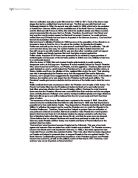How consistent were Bismarcks aims and methods from 1862 1871?
How consistent were Bismarck’s aims and methods from 1862 – 1871?
Otto van Bismarck is credited with the unification of Germany. However, it can be argued that he deliberately fostered this myth, and that it was never his aim to begin with. Bismarck had not intended unification for he was a Prussian patriot first and foremost. He distrusted the Southern Catholic German states and feared the submergence of Prussia in a united Germany. Above all else, Bismarck was consistently concerned to uphold and to extend the power of the Prussian state and Prussian king, and, to a lesser degree, to exclude Austria.
He was brought in as Prime Minister by the King of Prussia, King William I, in 1862 to combat liberal demands, however modest they were. In the nineteenth century, Germany was torn between princely conservatism on one hand, and fierce liberalism and nationalism on the other. Bismarck, as a noted Junker, certainly tended toward the former in the years 1862-1871. He did realise, however, that the liberal demands of German unification could not be completely ignored. Due to his Prussian patriotism, German unification was not one of his aims. The creation of a Northern German Confederation dominated by Prussia was what he hoped to achieve. The inclusion of the other German states was what one historian called an incidental 'by-product of his never-ending pursuit of Prussian interests".








